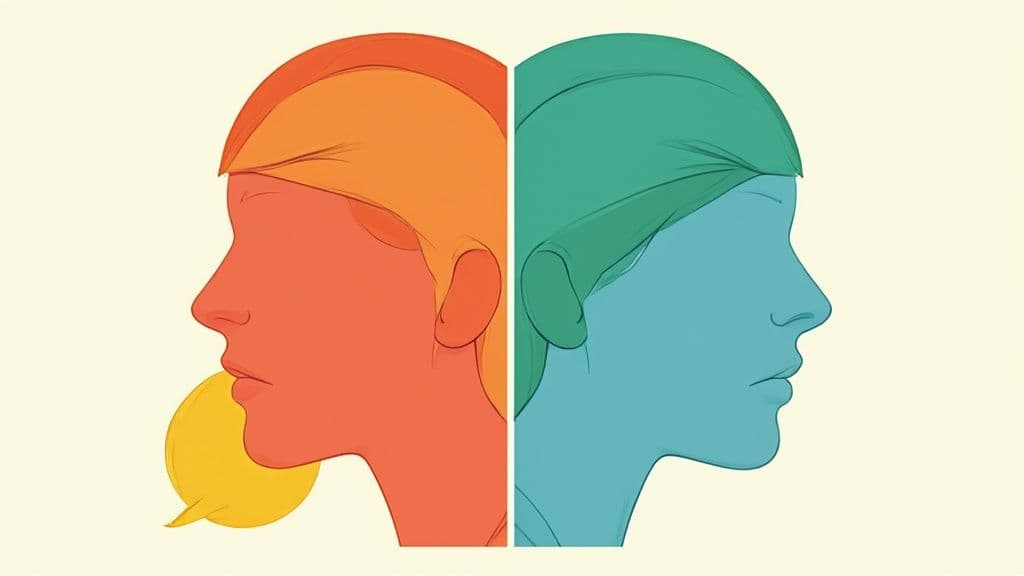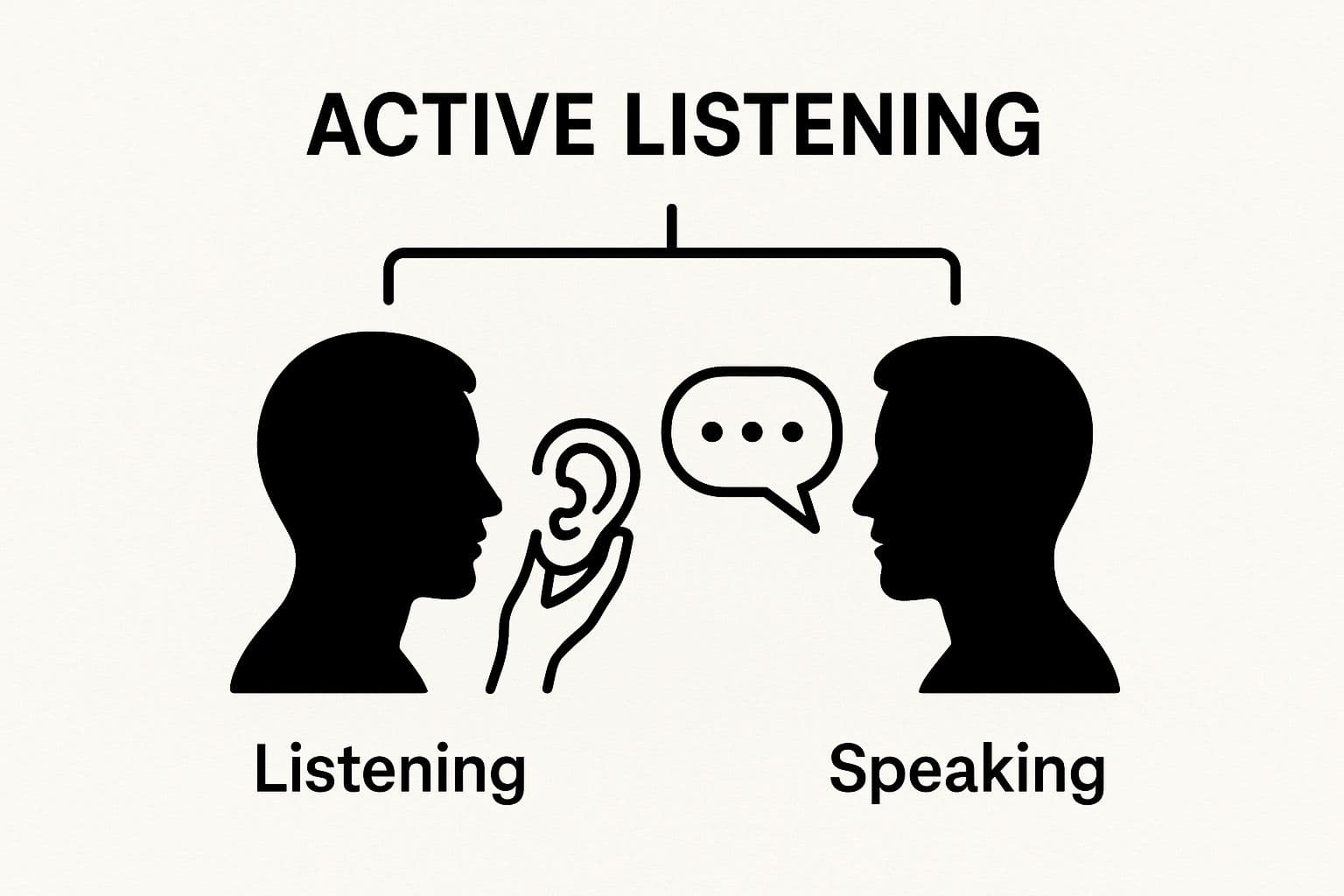Emotional intelligence for couples means recognizing your own feelings and truly hearing your partner’s. When both partners practice emotional awareness, self-regulation, empathy, and relationship skills, everyday interactions—and conflicts—become chances to deepen trust and connection.
September 7, 2025 (5mo ago) — last updated November 26, 2025 (3mo ago)
Emotional Intelligence for Couples
Daily emotional intelligence practices for couples to improve communication, deepen intimacy, and strengthen long-term trust.
← Back to blog
Emotional Intelligence for Couples
Summary: Build better communication, deeper intimacy, and long-lasting bonds with emotional intelligence skills couples can practice daily.
Introduction
Emotional intelligence for couples means recognizing your own feelings and truly hearing your partner’s. When both partners practice emotional awareness, self-regulation, empathy, and practical relationship skills, everyday interactions—and conflicts—become chances to deepen trust and connection.
What Emotional Intelligence Really Means for Couples

Think of emotional intelligence (EI) as a shared GPS for your relationship. It’s a practical set of skills you use every day to manage reactions, respond thoughtfully, and create safety. Couples who develop EI together build trust and resilience that help them navigate disagreements without lasting damage and celebrate positive moments with more appreciation.
The perception–reality gap
Many people overestimate their self-awareness. One study found roughly 95% of people believe they’re self-aware while only about 10–15% actually are1. That gap often causes misunderstandings: tone, body language, or unmet emotional needs can send a different message than the words being spoken.
Emotional intelligence is more than being nice
EI isn’t about avoiding conflict or staying pleasant at all costs. It’s about expressing needs clearly, managing emotional reactivity, and validating your partner’s experience—even when you disagree. These skills shape how you handle everything from finances to planning time together and are often influenced by each person’s attachment history.
“Emotional intelligence is the capacity to be aware of, control, and express one's emotions, and to handle interpersonal relationships judiciously and empathetically.”
Building EI is an ongoing practice that turns a good relationship into an extraordinary one.
The four pillars of a strong emotional connection
Emotional intelligence in relationships rests on four practical pillars. When each is tended to, the relationship becomes more stable and connected.

Pillar 1: Self-awareness
Self-awareness means noticing what you feel and why. It’s the difference between saying, “I’m mad,” and, “I’m feeling hurt and unappreciated.” Awareness gives you the choice to respond rather than react.
Pillar 2: Self-management
Self-management is the pause between feeling and action. It’s choosing a constructive response—like saying, “I need a moment to cool down”—instead of saying something you’ll regret. It doesn’t mean suppressing emotions; it means responding with intention.
Pillar 3: Empathy
Empathy is trying to understand your partner’s emotional world without judgment. It’s not about imagining how you’d feel; it’s about being curious about how they actually feel and validating that experience.
Empathy lets you say, “It sounds like you’re under a lot of pressure—that must be really hard,” which often builds more connection than immediate advice.
Pillar 4: Relationship skills
Relationship skills are the practical application of the other three pillars: clear communication, conflict management, and proactive bonding. Examples include voicing needs without blame, solving problems together, and nurturing intimacy.
| Pillar | What it means for you | How it looks in your relationship |
|---|---|---|
| Self-awareness | Recognizing emotions and triggers | “I know I get defensive when I feel criticized.” |
| Self-management | Choosing thoughtful responses | Taking a break to cool down during a tense talk. |
| Empathy | Understanding your partner’s emotional perspective | Listening to their stress without jumping to fix it. |
| Relationship skills | Putting EI into action to communicate and connect | Working together to find a solution that honors both needs. |
Mastery isn’t the goal—consistent practice is.
How high EI transforms everyday communication

EI shines brightest in everyday moments. Small interactions either build trust or chip away at it. Low-EI couples get stuck in blame and defend cycles where resentment grows. High-EI couples treat potential conflicts as chances to connect.
A tale of two conversations
Scenario 1: Low EI
- Partner A: “You never want to do what I want. We always have to go out with your friends.”
- Partner B: “That’s not true! I just don’t want to be stuck inside all weekend. You’re always such a homebody.”
This exchange escalates because both partners feel attacked and react defensively, losing sight of the underlying needs.
Scenario 2: High EI
- Partner A: “I feel disappointed about the weekend plans. I was really looking forward to a quiet night in with you.”
- Partner B: “I hear that—you need downtime together. I’ve been feeling cooped up and wanted to see friends. Can we find a way to do both?”
Starting with “I” statements and validating each other turns the issue into a shared problem to solve.
Using emotional intelligence to navigate conflict
Conflict is inevitable in meaningful relationships. EI changes the test from whether you fight to how you fight. With EI, arguments become repair opportunities instead of relationship wounds.
Three practical ways to use EI during disagreements:
- Take a strategic timeout (self-management): Agree on a simple signal—like saying, “I need a moment”—to cool down and avoid saying things you’ll regret.
- Use “I feel” statements (self-awareness): Replace blame with personal experience: “I feel unheard when I try to share my day.” It lowers defenses and invites empathy.
- Genuinely seek their perspective (empathy): Ask open questions such as, “Can you walk me through how you’re seeing this?” and listen to understand, not to rebut.
EI predicts relationship outcomes: one long-term study found EI explained a large portion of the variance in marital satisfaction over time2. Repair attempts and successful de-escalation are strong predictors of relationship longevity, so developing these skills matters for the long term4.
For conflict-resolution techniques and exercises, see our guide on how to resolve relationship conflict and how to build emotional intelligence.
Getting to know your partner on a deeper level
Zooming out helps empathy stick. Understanding your partner’s natural tendencies—what motivates them, what stresses them—makes it easier to respond with compassion rather than judgment.
Tools like Dan Millman’s The Life You Were Born to Live and the Life Purpose App offer a framework for seeing core tendencies and communication styles. These insights can reframe behaviors from “they’re trying to control me” to “this is how they operate,” opening space for more constructive conversations.
This perspective isn’t an excuse for harmful behavior; it’s a tool for compassion and clearer communication.
Practical ways to build emotional intelligence together
You don’t need grand gestures. Small, consistent habits create lasting change.
Simple practices:
- Weekly state-of-the-union (20–30 minutes): Check in without fixing—share wins and challenges while the other listens fully.
- 5-minute listening exchange: One person speaks for five minutes while the other only listens; then switch. No interruptions, no rebuttals.
- Build a feeling vocabulary: Expand beyond “mad” or “sad.” Try words like “overwhelmed,” “disappointed,” or “insecure.” A shared emotional language improves clarity.
For more exercises and guided practices, visit our practical resources on the Life Purpose App and related guides.
Common questions about EI in relationships
Can you actually learn emotional intelligence?
Yes. Emotional intelligence is a set of skills you can develop with practice—self-awareness, regulation, empathy, and communication all improve with intentional work and feedback3.
What if my partner has low emotional intelligence?
You can’t force change, but you can model EI. Manage your reactions, listen with empathy, and communicate needs calmly. Creating an emotionally safe environment often encourages your partner to lower defenses and grow.
How does the Life Purpose App help a relationship?
The Life Purpose App offers insight into core tendencies and life lessons based on Dan Millman’s framework. Use it as a supplemental tool to build empathy and shared language—never as an excuse for poor behavior.
Quick Q&A — Common user questions
Q: Where should we start if we want to build EI together?
A: Start small—try a weekly 20–30 minute check-in and the 5-minute listening exchange. Consistency beats intensity.
Q: How do I stop reacting defensively during fights?
A: Practice a simple timeout signal and use “I feel” statements to express needs without blame.
Q: Can EI fix deep relationship problems?
A: EI won’t solve every issue on its own, but it creates the foundation—trust, repair skills, and communication—needed to address deeper problems effectively.
Three concise Q&A summaries
Q: What immediate benefit will EI bring to my relationship? A: Better everyday communication: fewer escalations, more clarity about needs, and faster repair after disagreements.
Q: How long before we see change? A: Small habits practiced weekly—listening exchanges and short check-ins—can shift patterns in a few weeks; deeper shifts take consistent practice over months.
Q: What if one partner resists practicing EI? A: Model the skills and create safety. Focus on small, nonjudgmental actions that reduce defensiveness and invite cooperation.
Discover Your Life Purpose Today!
Unlock your true potential and find your life’s purpose.
